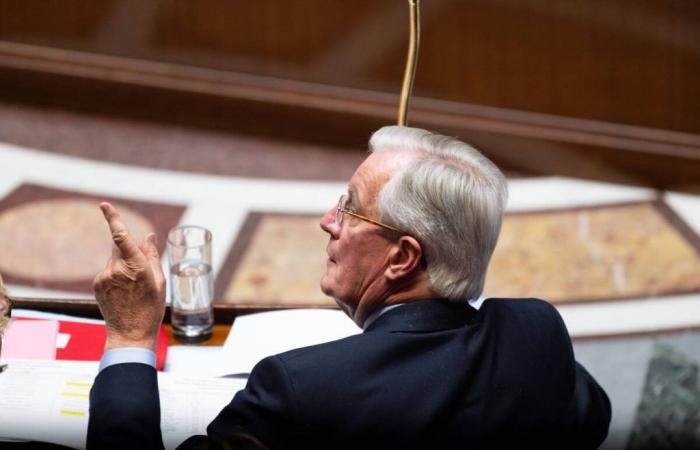Published on October 3, 2024 at 8:30 a.m.
Facebook Twitter E-mail Copy link
Send
Free access
For senior civil servant and economist Nicolas Dufrêne, the budgetary revenues concocted by the new Prime Minister belong to a dying ideological framework, structurally incapable of responding to the ecological crisis.
This article is a column, written by an author outside the newspaper and whose point of view does not commit the editorial staff.
To go further
Michel Barnier assured that his government would not “no miracle”. The miracle could have consisted of explaining that dealing with the ecological debt, that is to say, implementing a proactive policy of ecological reconstruction, will allow in fine to deal with financial debt and not the other way around. Because, in terms of financing the ecological transition, it is no longer possible to do “a lot with a little” as the Prime Minister called to do, especially when the ” little “ consists of drastically reducing the credits allocated to the most effective mechanisms such as the Green Fund or the Ademe Heat Fund, as this risks being recorded in the next finance bill (PLF).
It must be repeated: putting France on the path to carbon neutrality, without even talking about respect for life or social emergencies, requires several tens of billions of euros in additional public investment. This is the observation of the Pisani-Mahfouz report but also that, in more detail, of the Rousseau Institute, the European Commission, as well as all the serious players involved in this field. However, how can we reconcile this pressing need with the deficit falling below 3%, even pushed back to 2029 (which would require between 20 and 30 billion euros less in public spending each year)?
The ecological reconstruction of our country, which would allow our citizens to live better, to create local and non-relocatable employment, to free us from our external dependencies, to guarantee our place in the economy of the future, can no longer be achieved. put up with a double standard of promising a lot and doing little. Whether we like it or not, money is the sinews of war and achieving sobriety cannot be achieved by taking the path of austerity. In this regard, we may wonder why the multi-year strategy for financing the ecological transition, which the government is nevertheless obliged to present to Parliament soon, has not found its place in the Prime Minister’s general policy speech?
Prime Minister Michel Barnier, October 2, 2024 at the National Assembly. JEANNE ACCORSINI/SIPA
More profoundly, the governments that have succeeded one another for several years have shown themselves incapable of getting out of the triangle of incompatibility which is currently defeating the financing of the ecological transition: investing tens of billions of euros of additional public money to finance what is not profitable and yet necessary, to hold counterproductive and sterile budgetary commitments, and to refuse to consider new methods of financing in the budgetary and monetary domain.
However, to get out of this trilemma, you will need to show imagination and composure. It is therefore useful to remember that, despite our level of debt, for each auction of assimilable Treasury bonds (OAT), the supply of financing from the markets is three to four times greater than the demand for financing from the part of the State. Financial markets depend just as much on public debt as market States. Furthermore, the surge in interest rates, which certainly requires us to pay tens of billions of euros in interest to private actors, is not inevitable.
Also read
Billet No, we cannot put “ecological debt” and “economic debt” on the same level.
Free
Read later
Let’s remember that interest rates were higher a year ago. Contrary to what is usually believed, the level of interest rates is primarily determined not only by the financial markets but by the European Central Bank (ECB). When it wishes, the latter can always control rates, as it did during the period of quantitative easing [ou assouplissement quantitatif, NDLR] and during the Covid crisis, by imposing a zero or even negative public borrowing rate on the markets and others. The prospect of a further rate cut will soon bring down the rate of government bonds.
Furthermore, if we really wanted to drastically reduce our interest burden, we would have to regain political control over the Central Bank and require it to provide an outlet for public debt at low or even neutral rates. Wouldn’t the success of the ecological reconstruction of Europe justify it as much as the survival of the economy during the Covid crisis? Failing this, the Central Bank could at least practice differentiated interest rates, more favorable to States and less to private banks to avoid speculation, and between green and brown activities, instead of doing exactly the opposite. Emmanuel Macron himself had mentioned this avenue for green activities.
Two innovative solutions
If the Prime Minister spoke of a double sword of Damocles, ecological debt and financial debt, two innovative solutions could also allow us to free ourselves from it simultaneously. The first would consist of canceling the 4,000 billion euros of public debt that the ECB holds on its books, or rather of converting them into investments for ecological and social reconstruction, by making an “investment pact” between the States and the ECB. It would be painless for the markets, as for the ECB which can create unlimited money to compensate for its “loss”. This would free the States from a large part of the “debt burden” mentioned by the Prime Minister, while allowing them to finance major investment plans which will themselves generate new tax revenue and a revival of activity.
The second solution would be to use the monetary creation power of the ECB to finance investments which would be decided democratically by European and national authorities, in volumes and for uses which would be well thought out to boost the European economy, avoid inflationary tensions (or even reduce them by freeing ourselves from hydrocarbon imports) and external leaks. Free of debt when it was created, and therefore without impact on the debt, this currency would then spread throughout the economy, causing income to grow faster than debt (unlike what is happening today), which would constitute a weapon of massive debt reduction for both public and private actors, while boosting the economy. In fact, private debt is soaring even more than public debt, to the point that household liabilities in relation to their annual disposable income have increased in less than thirty years from 55% to more than 115%, obviating by as much as their consumption capacities.
Also read
Narrative These three ministers wrote a book on ecology (and the rest will not surprise you)
Free access
Read later
Such a solution will obviously be mocked by those who do not believe in“magic money”. What would they say if they knew that the ECB, to remunerate the enormous bank reserves deposited with it, created out of nothing more than 146 billion euros in 2023, which constitutes nothing more and nothing less than a free gift of money to the banks? And that she is also preparing to renew this donation for 2024? Wouldn’t this money be better used for the economic and ecological recovery of the country?
Emancipatory currency
Of course, a better balanced tax system that focuses more on the richest and large companies is an absolute necessity, firstly for tax justice but also to participate in this financing effort. But let’s not kid ourselves: taxation alone will not be able to respond to the immense financial challenges that face us. To respond in depth, in a sustainable and effective manner, to the double ecological and financial debt, the key is to be found in a new relationship between monetary creation and budgetary policy. This is what I defend through the idea of emancipatory money.
In the absence of innovative solutions, the path is clear: our harmful ideological commitments, prescribed by medieval medical economists who only know bloodletting as a remedy, will plunge us into a new lost decade, will cause us to miss the ecological and economic shift. that we must take and, icing on the cake, will obviously not allow us to reduce the debt any more than those who have failed to do so over the past fifty years. This is also the lesson of the Trente Glorieuses: the monetary facilities then available to the State had made it possible to considerably reduce the debt while authorizing a high level of public investment and growth, in a successful alliance between the private and public, while their dismantling led to an explosion of debt, a collapse of public investment and weak growth. It’s not too late to wonder about this.
BIO EXPRESS
Nicolas Dufrêne is a senior civil servant, economist and director of the Rousseau Institute. He notably published “Debt in the 21ste century. How to free yourself from it” (Odile Jacob, 2023).






